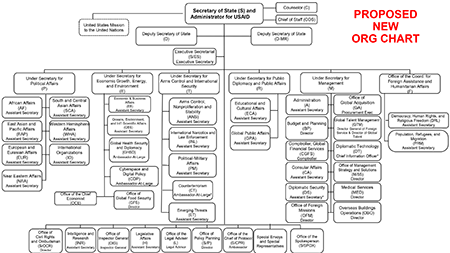State Reorganization to Merge Arms Control, Nonproliferation Offices
June 2025
By Daryl G. Kimball
U.S. Secretary of State Marco Rubio announced plans for a sweeping overhaul and downsizing of the State Department, including reducing U.S.-based staff by 15 percent and closing or consolidating more than 100 bureaus overseas.

“We cannot win the battle for the 21st century with bloated bureaucracy that stifles innovation and misallocates scarce resources,” Rubio said April 22 in a department-wide email obtained by the Associated Press. He said the reorganization aimed to “meet the immense challenges of the 21st century and put America First.”
Overall, Rubio’s plan calls for reducing the number of bureaus and offices from 734 to 602 through consolidation or elimination, according to a department fact sheet.
In addition to structural “efficiencies,” the proposed organizational chart would make several major functional changes, including eliminating the most senior department position dedicated to human rights and civilian security, abolishing the equity and global accountability offices, and further dismantling the U.S. Agency for International Development.
The plan also calls for another reorganization of the bureaus overseen by the undersecretary of state for arms control and international security that deal with nonproliferation, arms control and disarmament, which have been reshuffled four times since the late-1990s.
Rubio’s plan would fold the International Security and Nonproliferation Bureau (ISN) and the Arms Control, Deterrence, and Stability Bureau (ADS), formerly the Arms Control, Verification, and Compliance Bureau (AVC), into a single bureau with one assistant secretary instead of two.
The newly combined Arms Control, Nonproliferation, and Stability Bureau would become one of five bureaus (instead of the current three) under the Office of the Undersecretary for Arms Control and International Security. The other four new bureaus would be: International Narcotics and Law Enforcement; Political-Military Affairs; Counterterrorism; and Emerging Threats.
According to current and former U.S. officials, the consolidation of the ADS and ISN bureaus likely will reduce the capacity of the department and the government as a whole to deal with the broad range of arms control, nonproliferation, and disarmament challenges.
By expanding the scope of the issues for which the undersecretary of state for international security and arms control would be responsible and eliminating one of the two assistant secretaries, there will be less time and fewer senior officials available to deal with these critical issues.
In addition, U.S. officials note that potential staffing cuts and retirements could diminish the specialized expertise that senior decision-makers at the State Department and other executive branch agencies depend on to formulate and implement policy on nuclear, chemical, biological, and conventional arms control and nonproliferation matters, civilian nuclear cooperation, space security, security assistance programs, and conventional arms trade policy.
The Trump administration has nominated Thomas DiNanno to be the new undersecretary of state for international security and arms control. The Senate has not yet voted on his confirmation for the post.
The Rubio proposal would further downsize the number of personnel responsible for a wide range of nonproliferation, arms control, and disarmament matters and is part of a longer-term trend underway since the Arms Control and Disarmament Agency, first established in 1961 as an independent entity during the Kennedy administration, was folded into the State Department in 1999 during the Clinton administration. (See ACT, April 1997.) This ACDA merger led to the creation of the position of undersecretary for arms control and international security.
In 2005, the Bush administration merged the arms control and nonproliferation bureaus into the current ISN bureau. In addition, the verification and compliance bureau was expanded to include implementation. (See ACT, October 2005.)
In 2010, the Obama administration renamed the Bureau of Verification, Compliance, and Implementation (VCI) to become the Bureau of Arms Control, Verification and Compliance (AVC) and a number of offices in the ISN bureau were moved into the AVC. The ISN and Political-Military Affairs bureaus remained unchanged. At the time, Sen. Richard Lugar (R-Ind.), ranking member on the Senate Foreign Relations Committee, opposed the idea of combining the arms control and verification functions within a single bureau. (See ACT, November 2010.)
The latest proposed State Department changes have not yet been completed and Congress may decide to weigh in, but the department is moving forward with the plan.
It is not yet clear how the proposed reorganization will align with the results of the 180-day review of U.S. treaties and funding of international organizations that was mandated by a presidential executive order issued February 4.
The order directs that the secretary of state “conduct a review of all international intergovernmental organizations of which the United States is a member and provides any type of funding or other support, and all conventions and treaties to which the United States is a party, to determine which organizations, conventions, and treaties are contrary to the interests of the United States and whether such organizations, conventions, or treaties can be reformed.”
The review is to include “recommendations as to whether the United States should withdraw from any such organizations, conventions, or treaties.”
On May 2, the Trump administration also released an outline of its fiscal year 2026 budget request to Congress that calls for a $1.7 billion reduction in assessed and voluntary contributions to international organizations.
It states that “the budget pauses most assessed and voluntary contributions to UN and other international organizations, including the UN regular budget” in order “to preserve maximum negotiating leverage.”
Rubio, who was named acting national security advisor following the dismissal of Michael Waltz in April, has also moved to downsize significantly the National Security Council.
